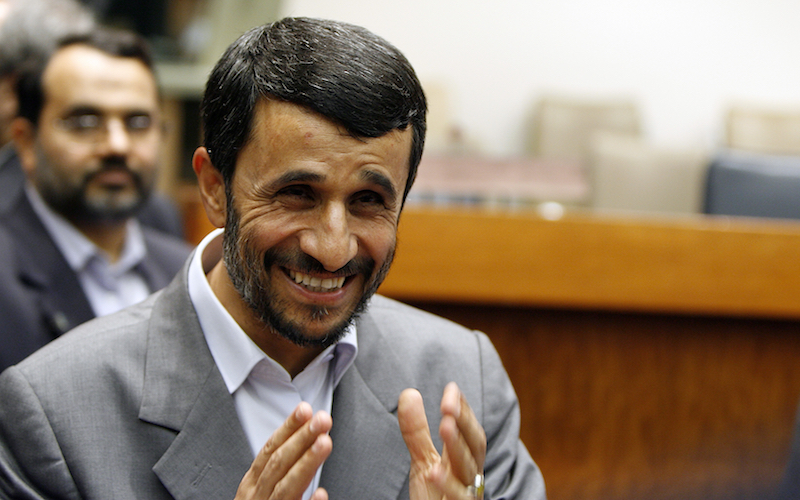
Why did Ahmadinejad Write to Trump?
Sanctions, lining up in front of banks, inflation, and daily increases in the exchange rate in the Iranian market are unpleasant reminders of Mahmoud Ahmadinejad’s presidency. His speeches addressed Holocaust denials, rhetoric about the destruction of Israel and American imperialism. He advertised his friendship with Morales and Chavez in Latin America in public meetings. Iran is still trying to export Islamic revolution to other countries. However, his memory has faded in the minds of many Iranian during the last four years, and a more secure and stable atmosphere has prevailed in the country.
But Ahmadinejad has once again made headlines in recent days. His deputy, Hamid Reza Baghaei, who was in prison for a while, has announced his candidacy for the presidential election. Meanwhile, the Supreme Leader has recently stated that he has advised Ahmadinejad not to be a candidate, in order to avoid a repetition of the events that occurred after the election in 2009, during which clashes occurred between protesters and the police. The protesters believed that the election was rigged.
A few days after announcement that Hamid Reza Baqai, Ahmadinejad’s deputy, will be a candidate in the May election, Ahmadinejad wrote to Trump a 3,500-word letter in which he asked Trump to call for women’s rights reforms. Meanwhile, the reformists inside Iran were criticizing Ahmadinejad for his authoritarianism and his social conservatism.
This is not the first time Ahmadinejad has written to an American president. He congratulated Obama and invited him to negotiate a direct flight between Iran and America and held a conference in Tehran to attract Iranian investments from abroad for the first time.
Houshang Amir Ahmadi is a professor at Rutgers University and is the director of the Middle Eastern Studies Department. He is one of the NIAC’s founders, a council aimed at improving the relationships between Iran and America. Islamic Republic opposition sees this council as leverage for the Islamic Republic of Iran although the council denies the charges and states that its major task is to bring Iranian and American people closer together.
During his trip to Iran this year and in an interview with the Asr-e-Iran website in the Esteghlal Hotel in Tehran, Amir Ahmadi called Ahmadinejad a hero. “Ahmadinejad talked against Israel to divert the attention from America. Ahmadinejad increased the Israel tension in order to reduce the tension with America. It was one of my own ideas. Ahmadinejad wanted to have a direct negotiation with Obama on nuclear issues.” Amir Ahmadi, who was educated in the West further stated “Mr. Ahmadinejad was a revolutionary and popular man who wanted to empower Iran and interact with America with full power. He believed that America responds to force, not good will. He believed interaction with America was permissible, but not with Israel.”
Hossein Moussavian, Iran’s former chief negotiator on nuclear issues, also believes that Ahmadinejad used his abilities during his second four-year presidential term to negotiate with America and reduce the tension between the two countries. In an interview with the Iranian Diplomacy website about three years ago, he mentioned that the only problem of Ahmadinejad in nuclear negotiations was uranium enrichment. He stated that the first bilateral negotiations among the ambassadors of Iran and America took place in Baghdad during Ahmadinejad’s presidency, the subject of which was Iraq and its problems. The second negotiation also took place among Saeed Jalili, Secretary of Supreme National Security Council, and diplomat William Burns. It was the time that Iran negotiated with America directly.
The origin of Ahmadinejad’s approach must be attributed to his young age during the hostage crisis of the America Embassy in Tehran in 1979. Abbas Abdi, one of the reformist activists in Iran and one of the students who participated in the embassy seizure stated that Ahmadinejad and his fellows believed that the Soviet embassy seizure should be a higher priority than the American embassy seizure. In 2010, Ahmadinejad asked America to defend the nuclear swap deal against nuclear fuel. Ahmadinejad knew this solution was the last chance to solve the nuclear dead-end problem, but the sequence of events worked against his goals.
Why was there no improvement in the relationships between Iran and America during Ahmadinejad’s presidency? First, Holocaust denial and his stated positions against the very existence of Israel. Second, the level of tension in the Iranian-American relationships increased so that there was no room for compromise. Third, after the 2009 election and its subsequent events, Ahmadinejad didn’t have the credibility as a legitimate president with Americans and Europeans. Finally, the modern Iranian middle class who wish for an improvement in relationships with the West didn’t support him as he was a religious politician with revolutionary slogans; the villagers and marginalized people were his major advocates.
The May election will determine whether Iranians are ready to forgive Ahmadinejad for his past mistakes.

